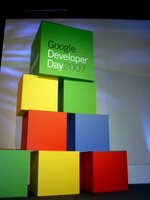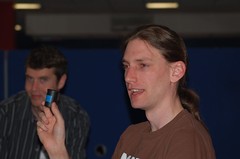 I am just sitting down at the end of Google developer day (UK) 2007 waiting for a webcast from Mountain View that I guess will be the US opening keynote presentation. A few years ago this would have been an exciting technological spectacle, but today the excitement is the anticipation over if the venue’s Internet connection can support the video stream as it has been struggling over the day with the large number of users.
I am just sitting down at the end of Google developer day (UK) 2007 waiting for a webcast from Mountain View that I guess will be the US opening keynote presentation. A few years ago this would have been an exciting technological spectacle, but today the excitement is the anticipation over if the venue’s Internet connection can support the video stream as it has been struggling over the day with the large number of users.
The event is being held at The Brewery, Barbican, London. I bumped in to Ian and Matt who were there to do the BBC Backstage presentation as well as Nick and Tom (who is either stalking me, or me him) who I have gotten to know at various BarCamps, and Simon who also made a flying visit and fully admits he came for the food. For reference the food was great with breakfast when we arrived and lunch a couple of hours later.
The first piece of clever thinking I came across was the large delegate badge with a personalised agenda on the back. We alsogot a bag of goodies including some Google goo (no, I don’t know what it is either), a yoyo, a flash drive (labelled 256MB, but really 512MB), a t-shirt and other Google branded goodies.
The keynote was from Chris DiBona and Ed Parsons and it was clear from this start that Google really are pushing geographic content and context at the moment. I will not write that much about the sessions I attended as you will be able to view them online if you are interested, but this is a quick summery.
Google and Open Source, Chris DiBona: I will be honest and say that I put this down as my reserve choice because Chris was presenting it, but I am glad I did. If you want to know more about the origination of open source and the various open licences available then this is worth a viewing.
Googel Earth and the GeoWeb, Peter Birch: This was what I was most interested in with my fascination with geographic data. This was a good introduction, and although I have already done several Google Earth live data mashups I feel that I learned something about the capability of the KML format. I was also really impressed by the demonstrations that used a special controller to navigate in the software. I did ask about the caching (or lack of caching) of the live KML data and reading between the lines I don’t think they are planning to improve this in the near future.
Googel data APIs, Lane LiaBraaten: This was the presentation I was most keen to see as I wanted to know everything I need to know to access my data on Google. Naturally I was expecting that bit too much, but this gave me a good starting point. I was pleased that someone asked about Google using OpenID. No plans at the moment, but they are aware that a lot of people are taking about it and asking them about it, so let’s keep asking. The question over if an API will be available to access the Gmail contacts was also raised, and this is something that they are also looking at. If this API is implemented then I will get my dream of linking Plaxo (that syncs my Outlook contacts) with Gmail.
New features in the Maps API, Giorgio Scherl: I have been meaning to do something with Google Maps for a while but have never quite got round to it. The big thing here was the introduction of Mapplets that will allow me to feed my data using KML in to the Google Maps site along side other feeds. This is something I will be doing with my travel information. I will also be following up on a discussion to help Google get at least some travel information on the UK maps.
If you did not know we had to select the sessions we wanted to attend a while ago and I was a little annoyed that I did not know more about some sessions before hand. If I had of known more would have attended the presentation on Google Gears, a browser plugin/extension that allows access to web services offline. Google Reader can already use this facility, and the APIs are available for anyone to do this. I can’t wait for Gmail and Calendar to be adapted for Gears.

 Delicious
Delicious Flickr
Flickr Google Plus
Google Plus Hackaday
Hackaday Instructables
Instructables Lanyrd
Lanyrd Twitter
Twitter YouTube
YouTube Facebook
Facebook Geocaching
Geocaching